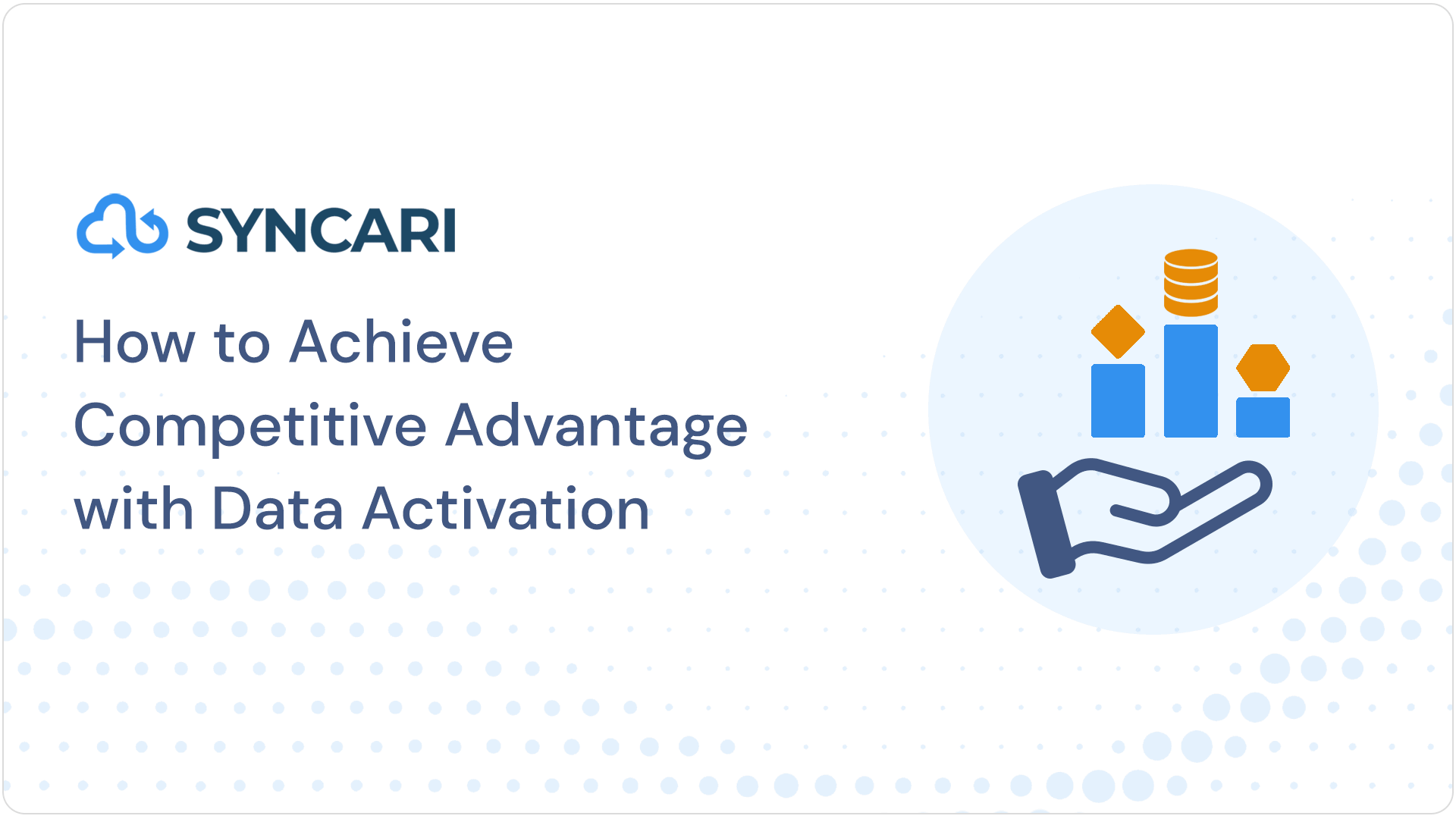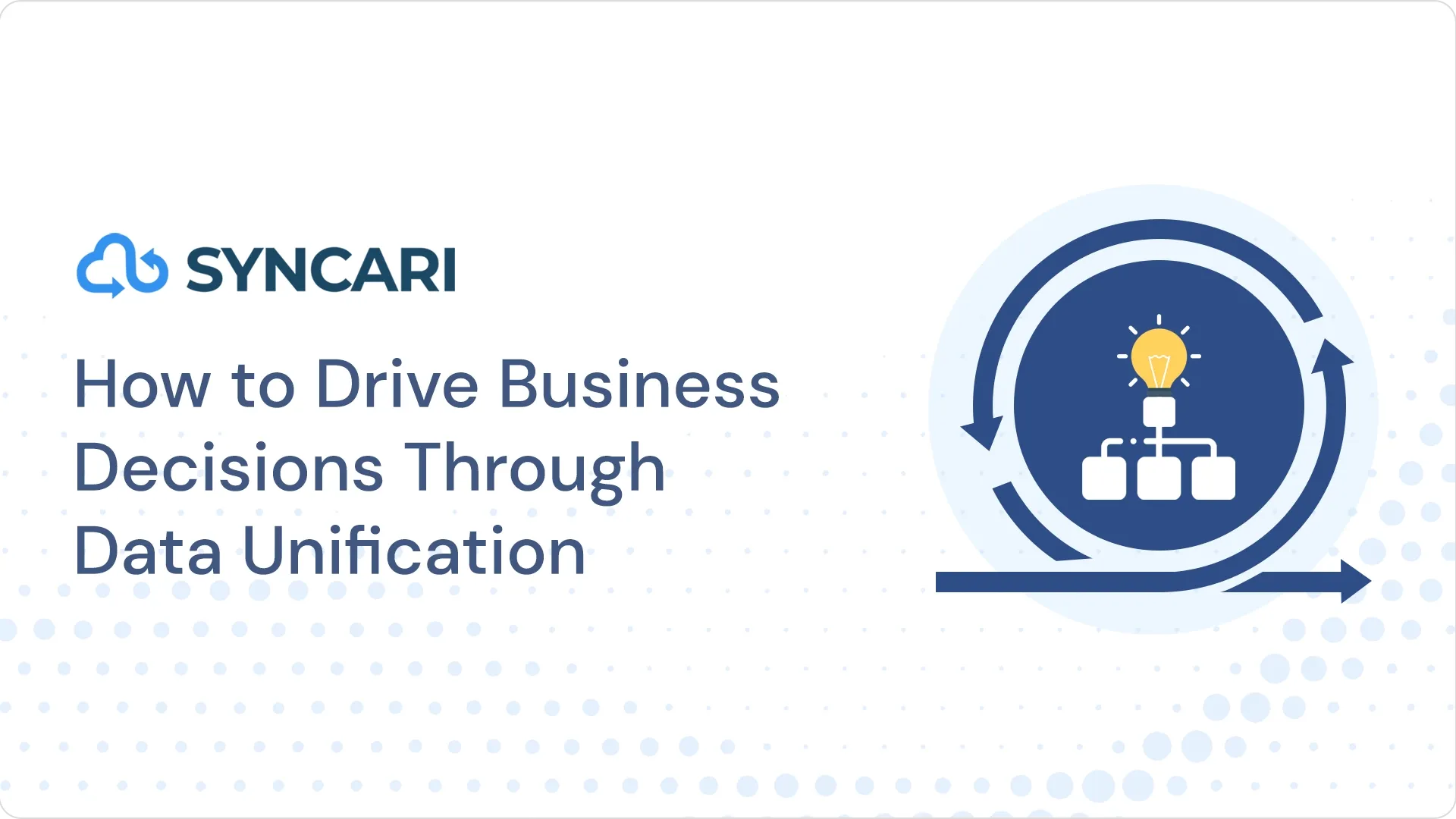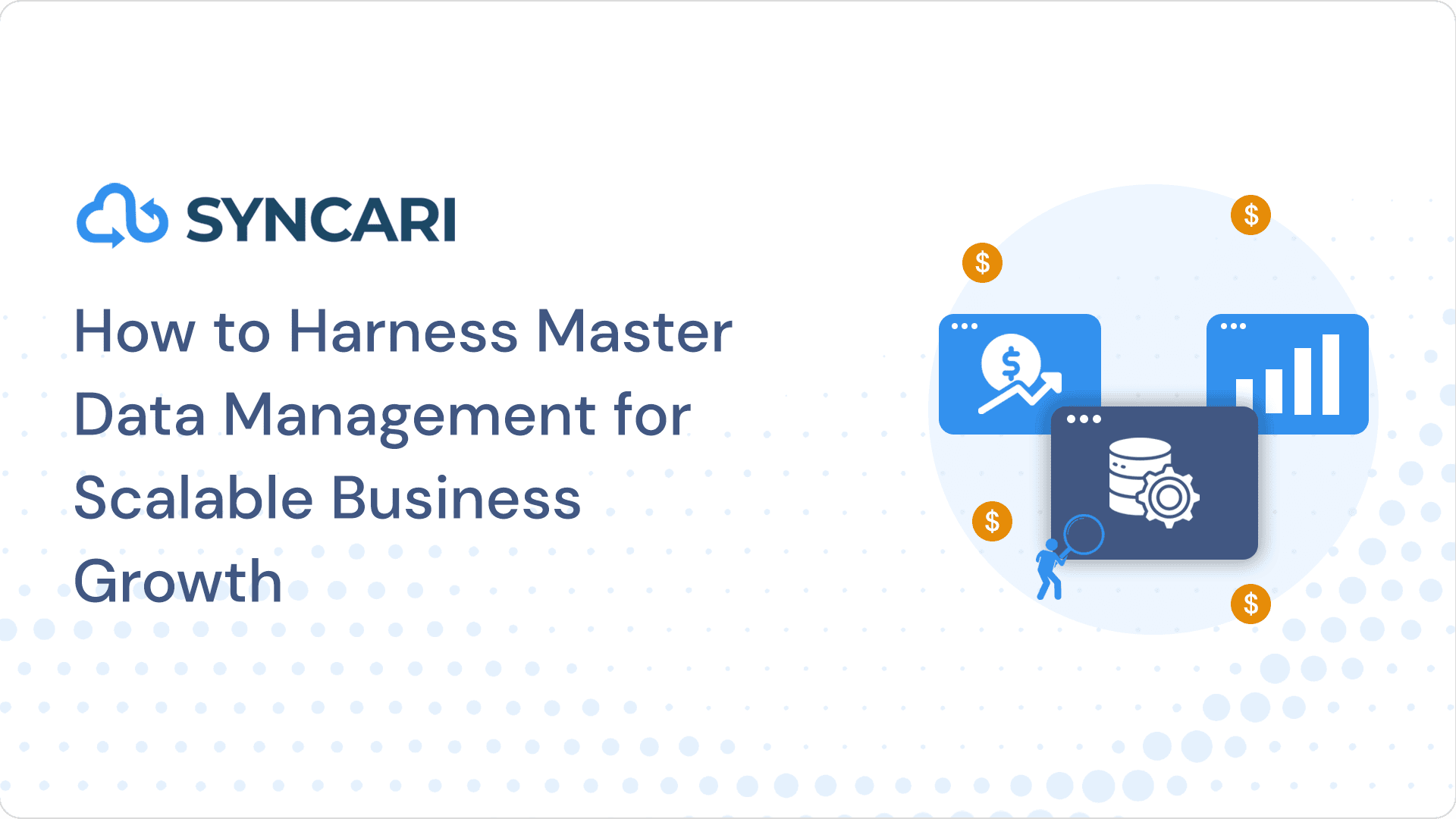The no-code revolution is here.
Data handling is important for IT professionals and business users in the B2B sphere. However, the technical knowledge required to understand Database Management Systems (DBMS) keeps smaller organizations without resources lost in the dark.
Does your brand need easy-to-use data integration and query solutions for efficient workflows? Read our Skyvia review to understand their services, offerings, and how your data can do more for you.
What is Skyvia?
Skyvia is a Cloud-based web service that provides data-based solutions for integration, backup, management, and connectivity. It specializes in ELT and ETL (Extract, Transform, Load), for which it has an import tool for advanced mapping settings.
It provides wizard-based data integration throughout databases and cloud applications with no coding. It aims to help small businesses securely manage their data from disparate sources with a cost-effective service.
With a few clicks, you can manage your data in any direction from various sources, such as Salesforce, SugarCRM, Google Suite, MailChimp, Shopify, etc as well as directly integrate to several applications.
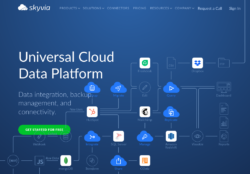
Skyvia Review: Features
Skyvia’s no-code data integration is easier for users with little technical experience through its wizard-based solution. Users can integrate and automate data collection to further streamline their workflow.
Its “freemium” model lets businesses of any size use its various solutions and packages to tackle their data requirements. The platform is based on Microsoft Azure cloud for better security and scalability.
Thus, Skyvia is easy to maintain and update without requiring on-site deployment.
Skyvia’s UI includes a monitor display history of the last 5 packages and a log tab for older packages to better record your processes. Error logs are instantly notified via email to be patched instantly.
Skyvia Review: Products
Skyvia Data Integration

Skyvia focuses on bringing effective batch data integration solutions with simple and advanced tools for specific use cases.
Whether a small company or a large organization, you can reliably run integration projects through a web browser. Skyvia provides email notifications for any failed runs. A detailed error log allows you to quickly identify and diagnose the issue.
Through their Data Flow tool, you can create advanced data pipelines for integrations with more than 2 sources. Data collection through different cloud apps and data warehouses, CSV export/import, and data migration can all be put into a readable diagram.
Skyvia offers integration in four packages: Import, Export, Synchronization, and Replication. Its accessibility enables users to automate and schedule single or multiple packages from different connectors.
- Data Import is a single-direction ETL tool that lets you import data from a specified source to a target connection. The mapping feature lets you directly import data, CSV files, and similar flat files to cloud apps and databases.
Detailed filter criteria help you create tasks in the package that meet the given conditions. Skyvia data import supports all DML operations. Users can update and delete source records in the target, and choose UPSERT to prevent importing duplicates.
Skyvia has strong transformation options, letting you split data from one source table or file to multiple related tables or objects. Transformation makes importing data from one source to a target of different formats possible.
The return feature for INSERT and UPSERT operations allows getting information like ids to be copied from the target database back to the source. If you want to preserve the relations of files in the target location, relation mapping lets you do that.

- Data Export works the same as data import in terms of usage. Functionally, the obvious difference is the transfer of data to a CSV file locally downloaded or saved to a cloud storage app. This package also requires no prior coding knowledge to export data, tables, and their related objects.
The filter conditions are as complex as you need them to be. The exported data and its related fields can be specified as filters even if they aren’t present in the exported data itself. Skyvia allows several export operations in one package.
- Data Synchronization is best to sync data in source and target. It has features similar to Import. It only needs additional mapping in both directions. Skyvia allows you to keep your data synced across different sources.
In addition to syncing data with different data structures at once, you get to decide the data, fields, and objects to sync manually. After the first sync, Skyvia automatically loads the changed data and applies the same from the source to the target and vice versa.
- Data Replication is based on the ELT process where the data is extracted from the source and loaded to the target as is. It is later transformed into the destination site.
Skyvia lets you automatically update and configure data copying in a database or data warehouse in no time. Automatic Schema Creation can create the necessary tables with the same structure as the replicated cloud objects when there is no database table.
Through optimizations and data source specific techniques, Skyvia provides efficient data extraction and API use to support custom objects and fields for data sources.
Skyvia also divides batch loading into per-record data insertions and error logging for easy diagnosis and patching.
Integration Pricing
|
Free
|
Basic
|
Standard
|
Professional
|
Enterprise
|
Skyvia Backup
Skyvia Backup is a reliable universal Cloud-based backup and recovery storage option in one solution. It lets you back up as many cloud applications and accounts as you need and only pay for the storage space you use.
You get to back up various cloud CRMs, Accounting, Marketing, E-commerce, and E-support applications in an intuitive and easy-to-use singular interface. Data backups can happen automatically or manually whenever you need it.
Skyvia adds a layer of security by using Azure Geo-redundant storage which is transmitted only in an encrypted format.
Backup Pricing
|
Free $0/mo. Storage 1 GB Export to CSV files Yes One-click restore Yes – – – – |
Standard $7/mo. Storage 20 GB Export to CSV files Yes One-click restore Yes Data search Backup comparison Automatic cleaning Automatic backups |
Professional $79/mo. Storage 200 GB Export to CSV files Yes One-click restore Yes Data search Backup comparison Automatic cleaning Automatic backups |
Enterprise $399/mo. Storage 1 TB Export to CSV files Yes One-click restore Yes Data search Backup comparison Automatic cleaning Automatic backups |
Skyvia Query
Skyvia Query can let you access, manage, and retrieve your data from databases and cloud applications through its browser-based SQL tool.
The Builder Mode is used to create complex queries without the use of code through the drag-and-drop feature. This helps users without knowledge of the SQL database to control their data. You can further export these queries as a PDF or CSV file.
Skyvia integrates directly with the Google Sheets Add-on and Microsoft Excel Add-In to collect data from multiple sources into one place.
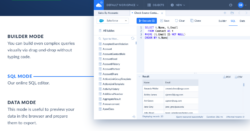
Query Pricing
| Free$0/mo.
Queries per day 5 Saved Queries 3 Traffic Limited |
Standard$15/mo.
Queries per day Unlimited Saved Queries Unlimited Traffic Unlimited |
Skyvia Connect
Skyvia Connect joins different data sources with data-related applications in a unified interface. You can create ready-to-use API endpoints without the need for coding. This can help integrate data through the OData protocol, or by linking it to data analysis and reporting tools.
Users can experience ready-to-use endpoint URLs without the need for hosting, maintenance, and administration alongside added security via HTTP authentication.
Connect Pricing
| Free$0/mo.
Traffic per month 100 KB Number of endpoints 1 Number of connectors 1 Connector Types Cloud – |
Basic$15/mo.
Traffic per month 1 MB Number of endpoints Unlimited Number of connectors Unlimited Connector Types Any – |
Standard$39/mo.
Traffic per month 100 MB Number of endpoints Unlimited Number of connectors Unlimited Connector Types Any Security Features |
Professional$79/mo.
Traffic per month 1 GB Number of endpoints Unlimited Number of connectors Unlimited Connector Types Any Security Features |
Skyvia Review: Downsides
For its impressive range of products and services, Skyvia does have its own set of downsides.
Some users have complained about poor controls and the inability to integrate with particular applications.
Technical bugs include not showing the appropriate error message, and customer service can sometimes prove unresponsive. Skyvia has online chat customer support during business hours in the Czech Republic.
Although we learned in detail about Skyvia’s automation solutions in our Skyvia review, some businesses might have different priorities when it comes to data. This is where Syncari comes into play.
Skyvia’s usability suffers from drawbacks that add on to become larger issues that need manual upkeep. For example, you cannot schedule Skyvia Query.
In terms of connectors, Skyvia is still behind on certain important features. Despite having a Salesforce integration, Skyvia doesn’t support Salesforce metadata. Their NetSuite connector also lacks support for transaction data extraction.
Skyvia might prove to be difficult for smaller businesses to work with. Users unfamiliar with integration software can feel lost as the functionality of major processes is not covered in their documentation.
Moreover, businesses requiring multiple solutions must spend their finances on subscribing to more than one package. This can quickly add up to the cost of working with Skyvia.
This is worse, considering Skyvia has reportedly suffered consistent outages within the last year.
Syncari: Accurate Data across Multiple Systems
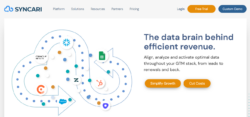
Syncari is a cloud-based data automation and management platform that helps businesses create more efficient workflows. Driven by AI, Syncari reduces tedious manual tasks such as data entry, data cleaning, and data mapping.
Additionally, Syncari unifies data across systems and applications via their patented multi-directional, stateful sync. This distinction enables optimal data hygiene so organizations can make better informed decisions and thus deliver better results. Syncari aims to derive more out of data while ensuring its compliance with the data governance policies.
Syncari: Features
Workflow Automation
Syncari’s workflow automation allows businesses to create and automate custom data workflows based on their specific needs and processes. Workflows are created using a visual drag-and-drop interface, making it easy for non-technical users to design and implement them.
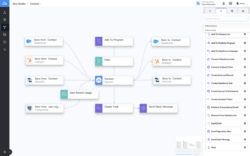
Here are some of the key features of Syncari’s workflow automation:
- Triggers: Workflows can be triggered based on a variety of events, such as when a new record is created or when a field is updated.
- Actions: Workflows can perform a range of actions, such as updating a record, sending an email notification, or triggering a webhook.
- Conditional logic: Workflows can include conditional logic, allowing businesses to define complex rules that determine which actions to take based on specific conditions.
- Error handling: Syncari’s workflow automation includes built-in error handling, so businesses can define what should happen if a workflow encounters an error.
- Collaboration: Workflows can be shared and collaborated on across teams, making it easy to automate and streamline data-related tasks across an organization.
By automating data workflows, businesses can reduce errors, save time, and increase efficiency. This allows teams to focus on higher-value tasks and spend less time on manual data-related tasks. Additionally, by automating workflows, businesses can ensure that data-related tasks are consistently executed according to best practices and company policies.
- Stateful Sync
Another notable feature is Syncari’s “Stateful Sync.” Why is this an important feature? Stateful sync ultimately ensures that data is kept consistent and up-to-date across multiple systems and applications.
In traditional synchronization, data is simply copied from one system to another. However, this approach can result in data inconsistencies, duplicates, and other issues, especially when dealing with large and complex datasets.
With stateful sync, Syncari tracks the state of the data being synchronized between systems, allowing it to detect changes and updates in real-time. This ensures that data is kept consistent and accurate across all systems, even when multiple changes are made simultaneously.
Stateful sync also allows for error handling and conflict resolution. If two systems make conflicting changes to the same data, Syncari can detect the conflict and resolve it according to predetermined rules, ensuring that the most recent and accurate data is retained.
Stateful sync is one of Syncari’s key features that helps to maintain data consistency, accuracy, and integrity, while reducing the risk of data errors and conflicts.
- Quality Connectors
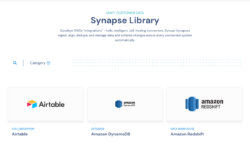
Everyone has integrations these days. However, the quality of any given out-of-the-box integration is questionable at best.
Syncari’s connectors are more powerful than a typical integration because they are designed to be more flexible, scalable, and resilient.
First, Syncari’s connectors are built using a modern microservices architecture, which allows for greater flexibility and scalability. Each connector is designed as a standalone service that can be easily customized and scaled to meet the specific needs of each integration. This architecture also allows for greater fault tolerance, as each connector can be independently monitored and restarted if necessary.
Second, Syncari’s connectors are built using modern API technologies, which provide greater interoperability and compatibility with other systems and applications. This means that Syncari can integrate with a wide range of systems, including legacy systems and newer cloud-based applications.
Third, Syncari’s connectors are built using advanced data mapping and transformation tools. This allows Syncari to easily map data between different systems and formats, even if they use different data models or structures. It also allows Syncari to automatically transform and normalize data to ensure consistency and accuracy across all systems.
Finally, Syncari’s connectors are designed with security and compliance in mind. They use industry-standard encryption and security protocols to ensure that data is always kept safe and secure, and they comply with key data privacy regulations like SOC-2 and CCPA.
Overall, Syncari’s connectors are more powerful than a typical integration because they are designed to be flexible, scalable, interoperable, secure, and compliant. This makes Syncari an ideal solution for organizations that need to integrate and manage data across multiple systems and applications in a reliable and efficient manner.
Syncari vs Skyvia
Much like Skyvia, Syncari does perform similar functions when compared side-by-side. Although they both specialize in data integration and management, their differences lie in what your company would use them for.
The most glaring difference between the two is how they handle data integration. Skyvia’s range of data integration tools are meant to give users several choices in how they want to store or transfer their data.
Syncari’s more holistic approach focuses on detecting and resolving data conflicts as soon as they arise so that businesses can maintain accurate and unified data across several systems.
Syncari’s Data Synchronization feature will automatically detect inconsistencies and attempt to resolve them so all systems are accurate.
Syncari’s advanced algorithms go a step beyond Skyvia’s UPSERT feature. Syncari uses intelligent data matching to merge records across different systems to reduce the odds of duplicate data.
Data workflows are another differentiator for Syncari. Syncari prioritizes maximizing time efficiency by reducing, if not eliminating, time spent on manual tasks by automating and managing data workflows via continuous stateful sync.
Conclusion
With everything laid out, it is safe to say that the choice between Skyvia and Syncari will depend solely on the individual business requirements of your company.
The complexity of your data workflows, data integration needs, budget, and technical expertise play a major factor in your decision for a data management and automation solution.
Skyvia focuses on large-scale integration whereas Syncari provides a comprehensive platform for managing data across the entire customer data lifecycle, from integration to automation to management to intelligence.
Think you can upscale your business with data? Try out Syncari for 30 days risk-free, or opt for a custom demo to see what you can unlock with the power of data.
